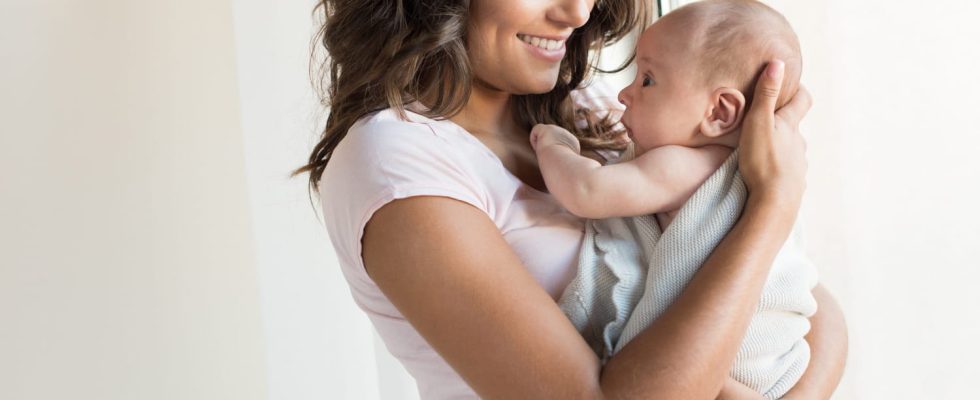Hiccups are common and benign in babies. Causes, age, position, belly, what to do to pass it? Lighting with Dr Noémie Nathan, pediatrician.
After a heavy meal or a drink drunk too quickly, associated with a change of positionbaby may have hiccups. This mild and painless symptom, which can last for several minutes (rarely more than half an hour), is triggered by an enlarged stomach, which compresses and irritates the diaphragm, causing baby to gasp. It can also occur for no particular reason during baby’s sleep, or if he has an empty stomach. This is particularly the case when it is overstimulated. When agitated, it can swallow air and cause a hiccup attack. Dr. Noémie Nathan, pediatrician, tells us more about the subject.
What causes hiccups in babies?
“The hiccup is due to a spastic and coordinated involuntary contraction of all the inspiratory muscles (diaphragm and intercostal muscles) associated with closure of the glottis. It results in repetitive and sometimes noisy shaking“, explains the pediatrician. “It is above all an uncontrollable respiratory reflex which leads to a succession of characteristic sound hiccups“, she continues.
“It’s an uncontrollable respiratory reflex that leads to a succession of characteristic sound hiccups.”
First thing, of course, we avoid all the grandmother’s methods reserved for adults! “To make the hiccups pass faster, you have to empty the stomach to decompress the diaphragm“, advises the expert. For that it is necessary breastfeed the baby, because swallowing causes the stomach to open and empty. We can :
- offer him the pacifier,
- offer him the little finger,
- a small bottle of water.
- Also feel free to rock him gently and pat his back to help release the air, as if he is burping.
Is it worrying if baby has frequent hiccups?
The hiccup is a perfectly banal and harmless phenomenon. So don’t worry if you can’t stop baby hiccups, it will go away by itself after a few minutes. You will also see that very often, the hiccups do not seem to bother him at all and that he continues to lead his little life without worrying about it in the least in the world.
On the other hand, keep an eye out if baby seems uncomfortable or if the hiccups cause pain. It’s important to make sure her hiccups aren’t the sign of GERD internal (gastroesophageal reflux disease).
Up to what age can a baby have hiccups?
In general, up to a year, babies may frequently have hiccupswhich can last from a few minutes to half an hour.
Immediately after the meal, it is recommended to keep baby upright for about 20 minutes. It is better not to lengthen it immediately afterwards, which could promote reflux and the appearance of hiccups. Indeed, lying on your back, the full stomach puts pressure on the diaphragm, thus causing small tremors. Si baby already have hiccupswear it on your forearm, so that his belly is pressed on it.
Baby has hiccups when lying down, why?
It is no coincidence that baby’s hiccups are frequently triggered when lying down. In effect, “the occurrence of hiccups is triggered by lying down, because the volume of the dilated stomach mechanically compresses the diaphragm which triggers the spasm”, details the pediatrician before adding that “the hiccups being completely harmless and painless for the child“, going to bed while having a hiccup is absolutely safe.
After a bottle or a feeding, can hiccups be triggered?
Baby can get hiccups regardless of how they feed, breast or bottle. Bottle-fed babies, however, are prone to it a bit more frequently, as they can swallow air due to the nipple, unlike breastfeeding. In general, the occurrence of hiccups depends mainly on the speed of the meal and the volume ingested.
Does the fetus have hiccups in its mother’s womb?
A fetus may very well have hiccups in utero. The explanation is very simple: in her mother’s womb, the fetus regularly swallows amniotic fluid, nothing extraordinary therefore that he may have hiccups, as will be the case later with a bottle of milk. This phenomenon is usually observed from the 20th week of pregnancy, i.e. during the fifth month of pregnancy. They are very noticeable by the future mother who makes a good distinction between baby’s movements and her hiccups!
Thanks to Doctor Noémie Nathan, pediatrician.
